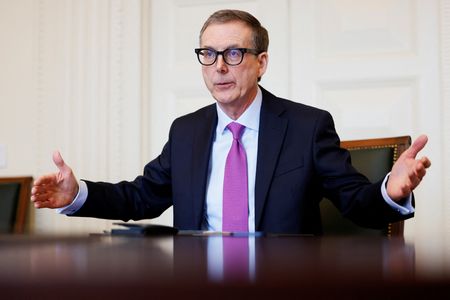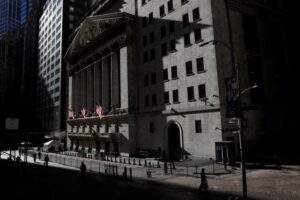By Steve Scherer and David Ljunggren
OTTAWA (Reuters) – The Bank of Canada on Wednesday hiked its key interest rate to 4.5%, the highest level in 15 years, and became the first major central bank fighting global inflation to say it would likely hold off on further increases for now.
The 25-basis-point rise matched analysts’ expectations. The bank has lifted rates at a record pace of 425 basis points in 10 months to tame inflation, which peaked at 8.1% and slowed to 6.3% in December, still more than three times the 2% target.
“We are turning the corner on inflation,” Bank of Canada Governor Tiff Macklem told reporters. “We are still a long way from our target, but recent developments have reinforced our confidence that inflation is coming down.”
Canada’s approach has until now matched that of the U.S. Federal Reserve, which ratcheted up its own target policy rate by 4.25 percentage points over the last year. The Fed is set to slow the pace of its hikes at a Jan. 31-Feb. 1 policy meeting and signal its battle against inflation is far from over.
Royce Mendes, director and head of macro strategy at Desjardins, said Macklem and his team would keep rates on hold for at least the next few months.
“As a result, we expect that this will be the final rate hike of this cycle,” he said.
Macklem said the bank wanted to take time to see how effective the rapid hikes had been in dampening excess demand and hot labor markets that have fueled inflation.
“To be clear, this is a conditional pause,” he said, noting there were upside risks to the outlook. “If these upside risks materialize, we are prepared to raise interest rates further.”
In its quarterly Monetary Policy Report (MPR), which includes new forecasts, the bank painted a picture of an economy that is going to stall and could tip into a recession during the first half of the year, bringing inflation down to about 3% at mid-year and back to 2% in 2024.
The central bank had said in December that future rate decisions would be data dependent, and a blowout December employment report, released earlier this month, highlighted the upside risk to wage and price growth.
Money markets actually see the Bank of Canada cutting rates already in October, but Macklem dismissed discussion of cuts as premature.
‘TOO EARLY FOR CUTS’
“It’s really far too early to be talking about cuts,” Macklem said. “The pause really is designed to give us time to assess whether we’ve raised interest rates enough to get inflation all the way back to target.”
A lower inflation rate could also provide some relief to the Liberal government. The main opposition Conservative Party accuses Prime Minister Justin Trudeau of driving up inflation with excessive spending.
“We’re not going to do things that will further contribute to the Bank of Canada’s need to fight inflation,” Trudeau told reporters in Hamilton, Ontario. The government is due to present its budget in the spring and has promised investments in healthcare and clean tech.
Conservative leader Pierre Poilievre, speaking in Ottawa, said the latest rate hike was a “sucker punch” from Trudeau.
“The cost of government is driving up the cost of living,” he told reporters in Ottawa. Poilievre repeated his demands that Macklem be fired on the grounds the bank had also bungled the COVID crisis.
The Canadian dollar was trading 0.3% lower at 1.3410 per greenback, or 74.57 U.S. cents. The 2-year yield eased nearly 6 basis points to 3.596%.
(Additional reporting by Fergal Smith and Maiya Keidan in Toronto and Ismail Shakil in Ottawa; Editing by Paul Simao, Mark Porter and Diane Craft)





